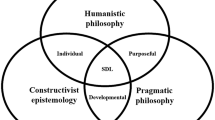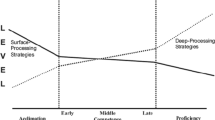Abstract
In Part I, we presented a dialectical constructivist account of the role of dynamic syntheses in learning and the modes of abstraction and how these relate to processes of adult learning. Our intent was to provide an explanation and integration of well-known research findings regarding three important issues: (1) the decline of mental effort with aging; (2) the contrasting findings about post-formal competencies and wisdom in later years; and (3) the ways in which these findings can be related to the often prescriptive accounts of adult education theorists, who discuss the role of self-directedness in adult learning. In Part II, we now turn to discuss a process-analytic account of the ego and the will in order to explain how the various modes of abstraction are employed in adult learning and how self-directedness can be brought about. We then conclude with a description of the types of instruction based on the ideas about modes of learning and abstraction that were discussed in the two papers.
Similar content being viewed by others
References
Arendt, H. (1981).The life of the mind. New York: Harcourt, Brace, Jovanovich.
Arlin, P. (1984). Adolescent and adult thought: A structural interpretation. In M. L. Commons, F. A. Richards, & C. Armon, (Eds.),Beyond formal operations: Late adolescent and adult cognitive development (pp. 258–271). New York: Praeger.
Arlin, P. (1989). Problem solving and problem finding in young artists and young scientists. In M. L. Commons, J. D. Sinnott, F. A. Richards, & C. Armon, (Eds.),Adult development, Vol. I: Comparisons and applications of developmental models (pp. 197–216). New York: Praeger.
Bakan, D. (1966).The duality of human existence: Isolation and communion in Western man. Boston: Beacon Press.
Basseches, M. (1984).Dialectical thinking and adult development. Norwood, NJ: Ablex.
Basseches, M. (1989). Toward a constructive-developmental understanding of the dialectics of individuality and irrationality. In D. A. Kramer & M. J. Bopp (Eds.),Transformation in clinical and developmental psychology (pp. 188–209). New York: Springer-Verlag.
Benack, S., & Basseches, M. A. (1989). Dialectical thinking and relativistic epistemology: Their relation in adult development. In M. L. Common, J. Sinnott, F. A. Richards, & C. Armon, (Eds.),Adult development Vol. I: Comparisons and applications of developmental models (pp. 95–109). New York: Praeger.
Berger, P. (1967).The sacred canopy: Elements of a sociological theory of religion. New York: Doubleday.
Berger, P., & Luckmann, T. (1966).The social construction of reality: A treatise in the sociology of knowledge. Middlesex: Penguin Books.
Bopp, M. (1984).A study of dialectical metatheory in psychotherapy. Unpublished doctoral dissertation, Temple University.
Brookfield, S. D. (1991).Understanding and facilitating adult learning: A comprehensive analysis of principles and effective practices. San Francisco: Jossey Bass.
Burnaby, J. (Ed.). (1955).Augustine: Later work. Philadelphia: Westminster Press.
Feuerstein, R., Rand, Y., & Hoffman, M. D. (1979).The dynamic assessment of retarded performers. Baltimore: University Park Press.
Globerson, T., & Zelniker, T. (Eds.). (1989).Cognitive style and cognitive development. Norwood, NJ: Ablex.
Gould, R. (1978).Transformations: Growth and change in adult life. New York: Simon and Schuster.
Irwin, R. R., & Sheese, R. L. (1989). Problems in the proposal for a “stage” of dialectical thinking. In M. L. Commons, J. D. Sinnott, F. A. Richards, & C. Armon, (Eds.),Adult development Vol. I: Comparisons and applications of developmental models (pp. 113–132). New York: Praeger.
James, W. (1966).Psychology: The briefer course (G. Allport, Trans.). New York: Harper Torchbooks.
Jaspers, K. (1970).Philosophy (Vol. 2). Chicago: University of Chicago Press.
Kant, I. (1951).Critique of judgment (J. H. Bernard, Trans.). New York: Hafner Press.
Knowles, M. S. (1980).The modern practice of adult education: From pedagogy to androgogy. New York: Cambridge University Press.
Kramer, D. A., & Woodruff, D. S. (1986). Relativistic and dialectical thought in three adult age groups.Human Development, 29, 280–290.
Labouvie-Vief, G. (1982). Dynamic development and mature autonomy: A theoretical prologue.Human Development, 25, 161–192.
Labouvie-Vief, G. (1990). Models of knowledge and the organization of development. In M. L. Commons, C. Armon, L. Kohlberg, F. A. Richards, T. Grotzer, & J. D. Sinnott, (Eds.),Adult development (Vol. 2, pp. 43–62). New York: Praeger.
Levinson, D. J., Darrow, C. N., Klein, E. B., Levinson, M. H., & McKee, B. (1978).The seasons of a man's life. New York: Ballantine.
Lewin, K. (1951). Intention, will and need. In K. Rapaport (Ed.),Organization and pathology of thought (pp. 95–150). New York: Columbia University Press.
Luria, A. R. (1973).The working brain. Middlesex: Penguin Books.
Merriam, S. B., & Cunningham, P. M. (Eds.). (1989).Handbook of adult and continuing education. San Francisco: Jossey-Bass.
Mezirow, J. (1978). Perspective transformation.Adult Education, 28(2), 100–110.
Mezirow, J. (1981). A critical theory of adult learning and education.Adult Education, 32(1), 3–24.
Mezirow, J. (1985). Concept and action in adult education.Adult Education Quarterly, 35, 142–151.
Mezirow, J. (1989). Transformation theory and social action: A response to Collard and Law.Adult Education Quarterly, 39(3), 169–175.
Ortega y Gasset, J. (1961).Meditations on Quixote. (E. Rugg & D. Marin, Trans.) New York: Norton. (Original work published 1914)
Pascual-Leone, J. (1983). Growing into human maturity: Toward a metasubjective theory of adulthood stages. In P. B. Baltes & O. G. Brim (Eds.),Life-span development and behavior (Vol. 5, pp. 117–156). New York: Academic Press.
Pascual-Leone, J. (1984). Attentional, dialectic, and mental effort: Toward an organismic theory of life stages. In M. L. Commons, F. A. Richards, & C. Armon, (Eds.),Beyond formal operations: Late adolescent and adult cognitive development (pp. 182–215). New York: Praeger.
Pascual-Leone, J. (1987). Organismic processes for neo-Piagetian theories: A dialectical causal account of cognitive development.International Journal of Psychology, 22, 531–570.
Pascual-Leone, J. (1989). An organismic process model of Witkin's field dependence-independence. In T. Globerson & T. Zelniker (Eds.),Cognitive style and cognitive development (pp. 36–70). Norwood, NJ: Ablex.
Pascual-Leone, J. (1990a). Reflections on life-span intelligence, consciousness, and ego development. In C. N. Alexander & E. Langer, (Eds.),Higher stages of human development: Perspectives on adult growth (pp. 258–285). New York: Oxford University Press.
Pascual-Leone, J. (1990b). An essay on wisdom: Toward organismic processes that make it possible. In R. J. Sternberg (Ed.),Wisdom: Its nature, origins, and development (pp. 244–278). Cambridge, England: Cambridge University Press.
Pascual-Leone, J. (1991). Emotions, development, and psychotherapy: A dialectical-constructivist perspective. In J. Safran & L. Greenberg (Eds.),Emotion, psychotherapy and change (pp. 302–335). New York: Guilford Press.
Pascual-Leone, J., & Goodman, D. (1979). Intelligence and experience: A neo-Piagetian approach.Instructional Science, 8, 301–367.
Pascual-Leone, J., & Ijaz, H. (1989). Mental capacity testing as a form of intellectual-developmental assessment. In R. Samuda, S. Kong, J. Cummings, J. Pascual-Leone, & J. Lewis (Eds.).Assessment and placement of minority students: A review for educators (pp. 143–171). Toronto: Hogrefe International.
Pascual-Leone, J. & Morra, S. (1991). Horizontality of water level: A neo-Piagetian review.Advances in Child Development and Behavior, 23, 231–276.
Piaget, J. (1962). Will and action.Bulletin of the Menninger Clinic, 26, 138–145.
Ricoeur, P. (1967). Philosophy of will and action. In E. W. Straus & R. M. Griffith (Eds.),Phenomenology of will and action (pp. 8–25). Pittsburgh: Duquesne University Press.
Riegel, K. (1973). Dialectical operations: The final period of cognitive development.Human Development, 16, 346–370.
Sartre, J. P. (1976).Critique of dialectical reason: Part one, theory of practical ensembles (A. Sheridan-Smith, Trans.). London: Verso. (Original work published 1960)
Scheler, M. (1961).Man's place in nature (H. Meyerhoff, Trans.). Boston: Beacon Press.
Scheler, M. (1973).Selected philosophical essays (D. R. Lachterman, Trans.). Evanston, IL: Northwestern University Press. (Original work published 1957)
Silber, J. R. (1960). The ethical significance of Kant's religion. In I. Kant (Ed.),Religion within the limits of reason alone (pp. LXXIX-CXXVII). New York: Harper and Row.
Stewart, L. & Pascual-Leone, J. (1992). Mental capacity constraints and the development of moral reasoning.Journal of Experimental Child Psychology.
Vygotsky, L. S. (1978).Mind in society: The development of higher psychological processes (M. Cole, V. John-Steiner, S. Scribner, & E. Souberman, Eds.). Cambridge, MA: Harvard University Press.
Wapner, S., & Demick, J. (Eds.). (1991).Field dependence-independence: Cognitive style across the life span. Hillsdale, NJ: Erlbaum.
Author information
Authors and Affiliations
Rights and permissions
About this article
Cite this article
Pascual-Leone, J., Irwin, R.R. Noncognitive factors in high-road/low-road learning: II. The will, the self, and modes of instruction in adulthood. J Adult Dev 1, 153–168 (1994). https://doi.org/10.1007/BF02260091
Issue Date:
DOI: https://doi.org/10.1007/BF02260091




